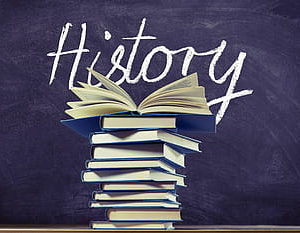Editor’s Note: For another viewpoint, see Counterpoint: The Hard but Hopeful Story of America
We should stop teaching history in our schools.
The way history is now being taught leads to a racist society, perpetuates white privilege and overlooks the contributions of women and minorities. I ask school districts to immediately remove history curricula, books and materials that unfairly communicate history until suitable alternatives are developed.
Enslaved people built our young nation and made possible an economy that would throw off the control of the most powerful country then on earth, Great Britain. But, oh at what a price.
According to Bennett Minton in The Washington Post, some schools across the country intend to teach slavery by way of “The 1619 Project,” the essays published in the New York Times last year that won the Pulitzer Prize.
Sen. Tom Cotton (R-Ark.) is so against its version of history that he has introduced a bill barring the use of federal funds to teach it. “As the Founding Fathers said,” Cotton told an interviewer in defending his stance, slavery “was the necessary evil upon which the union was built.”
This action is not an effort to erase history. But, the dominant majority culture has to realize the effect that the current telling of history has on a people, especially Black people. Important parts of our history have not been told or taught because it hasn’t been believed it actually happened.
Until they saw it on their TV screens, the dominant white culture didn’t believe that Blacks could be treated like John Lewis was treated, getting knocked unconscious with a cracked skull just because he was nonviolently protesting for the simple right to vote.
Many did not believe that so many Blacks are victimized by police until they saw the last 8 minutes and 46 seconds of George Floyd’s life under the knee of a policeman, recorded on video.
In Isabel Wilkerson’s recently released and highly recommended new book “Caste: The Origins of Our Discontents,” she describes a caste system as an artificial construction that sets the presumed supremacy of one group against the presumed inferiority of other groups.
Regarding Black people in America, Wilkerson states, “This caste system would trigger the deadliest war on U.S. soil, lead to the ritual killings of thousands of subordinate-caste people in lynchings, and become the source of inequalities that becloud and destabilize the country to this day.”
Regarding the teaching of this history, Wilkerson instructs further, “You don’t ball up in a corner with guilt or shame at these discoveries. You don’t, if you are wise, forbid any mention of them. In fact, you do the opposite. You educate yourself… then you… work to ensure that these things, whatever they are, don’t happen again.”
I taught social studies to sixth-, seventh- and eighth-graders in the Chicago Public Schools for six years. I have received many letters of support from history teachers supporting this move. I have heard from teachers who don’t have enough resources and have had to buy their own more appropriate instructional materials.
One Illinois eighth-grade social studies teacher wrote to me to say, “How can educators teach students an accurate history in which the contributions of Black and African Americans, Latinx Americans, women, religious minorities, members of the LGBTQ+ community, and other historically marginalized groups are included when none of their training and education has prepared them to do so?
If there is to be widespread change, there must be adequate funding, guidance, collaboration with both K-12 teachers and those in higher education to address gaps in educator preparation courses, and measures of accountability that not only include teachers but curriculum directors, instructional coaches, and administrators.”
Until a suitable alternative is developed, we should instead devote greater attention toward civics and ensuring students understand our democratic processes and how they can be involved. Students need education about voting, how a bill becomes a law, and how citizens can influence government that affects their daily lives.
I proudly fly the American flag on my house every day of the year because I love the flag and “the Republic for which it stands, one Nation under God, indivisible, with liberty and justice for all.” This is our own moment in history.
Together, let’s create an open and fair way to teach and learn our history, if we want to achieve a more perfect union.

